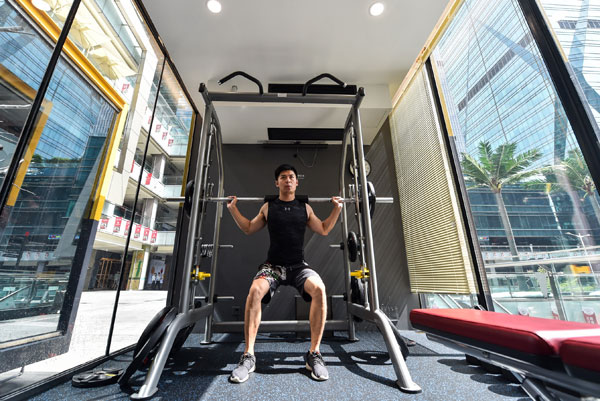Internet reshaping fitness industry
 0 Comment(s)
0 Comment(s) Print
Print E-mail China Daily, January 17, 2018
E-mail China Daily, January 17, 2018
The omnipresent internet is reshaping the fitness industry and pushing it to become more accessible, affordable and customized.

In Beijing's buzzing Sanlitun business district alone, more than a dozen gyms-specializing in everything from spinning to yoga to boxing-can be found along a stretch of road only two blocks long. In their midst, few might notice the most specialized club of all-an orange cubelike gym with its lights on 24/7, and almost no staff to be seen.
It's Supermonkey, a very young gym brand that uses a mobile app to do everything-entry permit, class-booking and body-condition assessment, etc-and it's an example of where the fitness industry is heading to in the era of internet.
"The fitness industry needs to become more like retail and give its users more freedom," said Liu Shuting, founder of Supermonkey.
But the transition to offline has been bumpy. Before the internet companies started to build their own tiny gyms, companies such as Xiaoxiong Kuaipao Tech Co Ltd tried to team up with traditional gyms-an experiment that didn't end well.
Considering users nowadays are constantly moving and don't have the time or energy to commute to their gyms, Xiaoxiong offered a monthly membership that allowed its users to swing by any convenient gyms the app worked with up to three times a month.
However, such a mode was soon rejected by many gyms as it rocked the membership tradition, forcing the internet entrepreneurs to find another way out-namely, setting up their own gyms and making the fitness business something similar to retail.
Now there are a few companies including Xiaoxiong Kuaipao and Supermonkey that run their own gyms-small but well-equipped facilities that can be operated on a low budget, so they can gain revenue from monthly membership and pay-as-you-go training fees.
Usually located in central business areas, Supermonkey gyms are no more than 50 square meters, making them cheaper to duplicate across the city. The gym charges its members on a pay-as-you-go basis for 50 yuan ($7.57) per entry. Its team classes with trainers cost around 100 yuan.
A single gym can be used 50 to 60 times a day, resulting in a monthly profit of about 50,000 yuan, data from Supermonkey shows.
"I'm thinking to use Supermonkey now," said Zhang Xiao, a 25-year-old media worker in Shanghai. "Competition in the fitness industry is really fierce. If you have bad luck in choosing the gym like me, you can have your gym membership invalidated because the gym can go out of business really soon."
Supermonkey doesn't require yearly memberships, allowing Zhang to pay her personal trainer for each class, individually, she said.
"I booked personal trainers before, which required a large sum of money up-front because I had to pay 30 classes at one go," Zhang said. "When the gym closed down, I had to train in another gym for the same training."
"I would rather say my company is a retail brand," said Supermonkey founder Liu. "We are building up a fashionable lifestyle, and by a pay-as-you-go mode, we can connect customers' feedback and optimize our products."
In its short-term goal, Supermonkey aims to spread from Shenzhen, where the business started, to Shanghai and Beijing, and increase its gym number to 200 by 2020.






Go to Forum >>0 Comment(s)